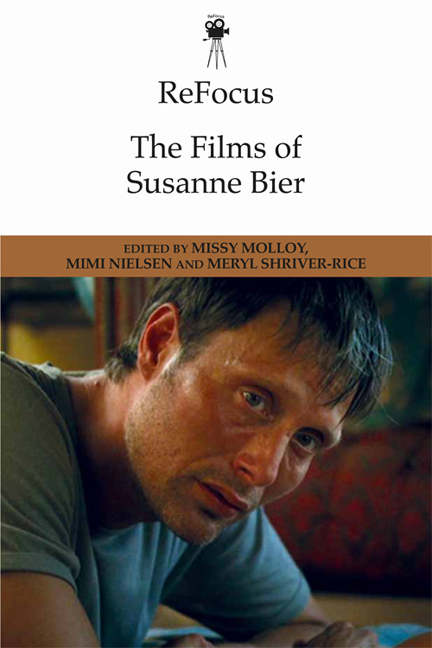Book contents
- Frontmatter
- Contents
- List of Figures
- Notes on Contributors
- Foreword
- Introduction: Susanne Bier's Boundary-Crossing Screen Authorship
- Part 1 Generic and Industrial Fluidity
- Part 2 Negotiating Identity
- Part 3 Authorship and Aesthetics
- Part 4 Transnational Reach
- Postscript: A Conversation with Susanne Bier
- Filmography of Susanne Bier
- Acknowledgments
- Index
Part 1 - Introduction
Published online by Cambridge University Press: 01 May 2021
- Frontmatter
- Contents
- List of Figures
- Notes on Contributors
- Foreword
- Introduction: Susanne Bier's Boundary-Crossing Screen Authorship
- Part 1 Generic and Industrial Fluidity
- Part 2 Negotiating Identity
- Part 3 Authorship and Aesthetics
- Part 4 Transnational Reach
- Postscript: A Conversation with Susanne Bier
- Filmography of Susanne Bier
- Acknowledgments
- Index
Summary
Bier's generic flexibility is striking. It has allowed her to be successful in multiple genres and to combine generic elements in a way that constitutes one of her authorial signatures: the integration of extremely dramatic scenarios with a close attention to character psychology that is inflected with irony and humor. Moreover, the qualities associated with the two genres Bier is known for—drama and romantic comedy—often overlap in her individual works. For example, her first feature, Freud's Leaving Home (Freud flyttar hemifrån …, 1991), is an often comical treatment of a tragic circumstance, in which a family confronts the impending death of its matriarch, Rosha, while gathered to celebrate her sixtieth birthday; in addition, the film foregrounds the youngest daughter's delayed coming of age and cultivation of a first love affair. Meanwhile, Love Is All You Need (Den skaldede frisør, 2012) is classified as a romantic comedy, yet deals with the radical life changes Ida initiates while in limbo between breast cancer treatment and results, which include leaving her husband of more than twenty years and falling in love.
Romantic and erotic undercurrents are conspicuous elements of Bier's storytelling regardless of generic classification, as is sensitivity to human vulnerability and absurdity, which generates humor in situations that might lend themselves more easily to drama. The chapters in this section grapple with relevant complexities in their discussions of films with diverse generic, narrative, and industrial elements. Their arguments underscore the productive potential of questions related to genre while providing multiple frames for understanding Bier's generic mobility, as well as its impact on efforts to construct a coherent portrait of Bier as a screen author.
In “Storytelling Schemes, Realism, and Ambiguity: Susanne Bier's Danish Dramas,” Birger Langkjær connects Bier's approach to genre with Danish cinema's gradual shift, apparent since the 1990s, from realism and folk comedy to mainstream genres with greater international appeal. Langkjær suggests that Bier's romantic comedies and dramas evidence this broader shift, which he locates in a preference for the “tight narrative structures” observable in Danish cinema during the last several decades.
- Type
- Chapter
- Information
- ReFocus: The Films of Susanne Bier , pp. 15 - 18Publisher: Edinburgh University PressPrint publication year: 2018



